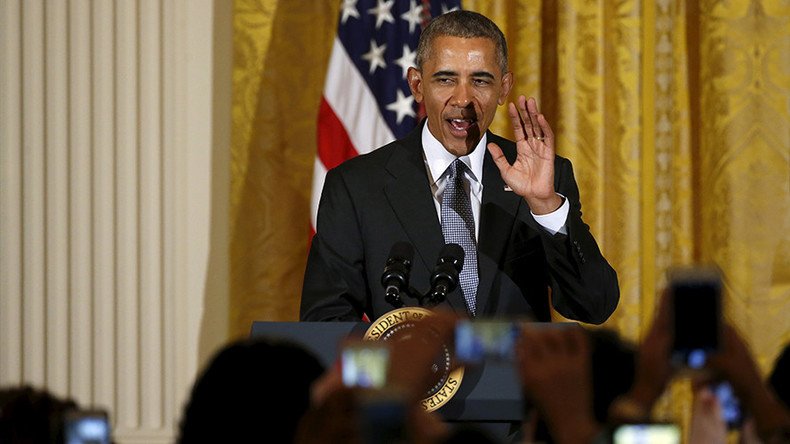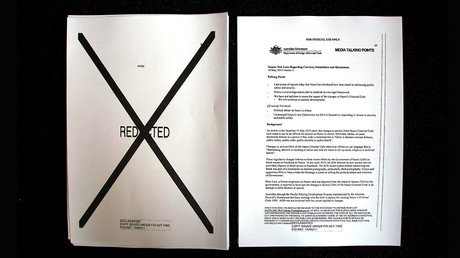‘I just don’t believe them’: US gov’t sets new record for failed public records searches

President Barack Obama’s promise to have the “most transparent administration in history” doesn’t hold water, as the government has set a new record for failed public records searches under the nation’s transparency laws.
In 2015, the government failed to disclose any documents for nearly 130,000 Freedom of Information Act (FOIA) requests, according to an Associated Press analysis that involved all requests made to 100 federal agencies.
Notably, the FBI failed to find any related documents to 39 percent of FOIA requests it received, while Customs and Border Protection came up empty handed 34 percent of the time. The Environmental Protection Agency’s regional office covering New York and New Jersey failed to stump up for a staggering 58 percent of requests.
In 77 percent of all cases, the Obama administration either censored documents it turned over, or simply withheld their release. That amounted to 596,095 cases, also a new record. In 250,000 of these cases, the administration said it couldn’t find records, that the request was unreasonable or improper, or that the person making the request would not pay for copies.
'Most transparent' Obama administration sets new record for not finding any files requested under #FOIA@jackgillumhttps://t.co/HZ0wEDyQzh
— Ted Bridis (@tbridis) March 18, 2016
Under FOIA rules, individuals, organizations and journalists who make requests should be given access to the documents in question – except in cases that may harm national security, violate privacy rights, or reveal trade secrets or decision-making processes.
However, many journalists and advocacy organizations have blasted the Obama administration for making it more difficult to obtain records through FOIA. Some have even testified before Congress that they would wait months or years for the government to respond to requests, or accused the authorities of not being forthright.
"It seems like they're doing the minimal amount of work they need to do," Jason Leopold, an investigative reporter at Vice News and an expert on FOIA, told the AP. "I just don't believe them. I really question the integrity of their search."
Sometimes, the government will deny that any records exist only to uncover thousands of documents after lawsuits have been filed. When Gawker sued the State Department over its failure to hand over any documents related to communications between journalists and an aide to former Secretary of State Hillary Clinton, the agency uncovered 90,000 documents.
The Obama administration said that roughly 770,000 requests were completed last year, but the White House has come under fire from critics who say it is undermining the law and exempting itself from far too many requests. The administration used FOIA exemptions 466,402 times during Obama’s first year in office, according to the National Press Club – a 50-percent increase over the last year of the George W. Bush administration.
One reason behind the slow processing of requests could be that the more efficient an agency is at honoring FOIA, the more inundated it will be, David Sobel, senior counsel at the Electronic Frontier Foundation, said at a recent National Press Club panel.
“I don’t think you can underestimate the power of bureaucracy” in impeding openness, “and it transcends any administration,” added Michael Doyle, a legal affairs correspondent at McClatchy Newspapers.
White House opposition to efforts that would reform FOIA has also been reported, however. Earlier this month, Vice’s Leopold reported that the Obama administration actively lobbied lawmakers to kill reform, despite the fact that separate bills passed the Senate and the House of Representatives with bipartisan support. Lawmakers failed to reconcile the differences between the two bills and no reform bill was ever brought to a final vote.
Information Breakdown: FOIA act wracked by exemptions, redactions [VIDEO]https://t.co/0TY4uA6IiI@Yaro_RTpic.twitter.com/EIFKzKpKCF
— RT America (@RT_America) January 22, 2016
Following a lawsuit by the Freedom of the Press Foundation, documents related to the reform effort were released, and a secret Justice Department memo relayed that the Obama administration “strongly opposed passage” of FOIA reform, arguing it would increase the backlog of requests and raise costs.
"The Administration views [the House bill] as an attempt to impose on the Executive Branch multiple administrative requirements concerning its internal management of FOIA administration, which are not appropriate for legislative intervention and would substantially increase costs and cause delays in FOIA processing," the document read. "The Administration believes that the changes are not necessary and, in many respects, will undermine the successes achieved to date by diverting scarce processing resources."
Despite failures to reform the law, journalists still believe it is essential for informing the public, noting that it took a FOIA request to reveal how reform was killed.
"This FOIA reform bill was incredibly modest, had already been watered down, and had the unanimous support of both parties — something that, in today's political climate, almost never happens," Trevor Timm, executive director of the Freedom of Press Foundation, told Vice. "Transparency advocates have been very cynical of the Obama administration's claim that they're the ‘most transparent ever,’ but the fact that they opposed virtually every aspect of this bill is sadly a new low."













